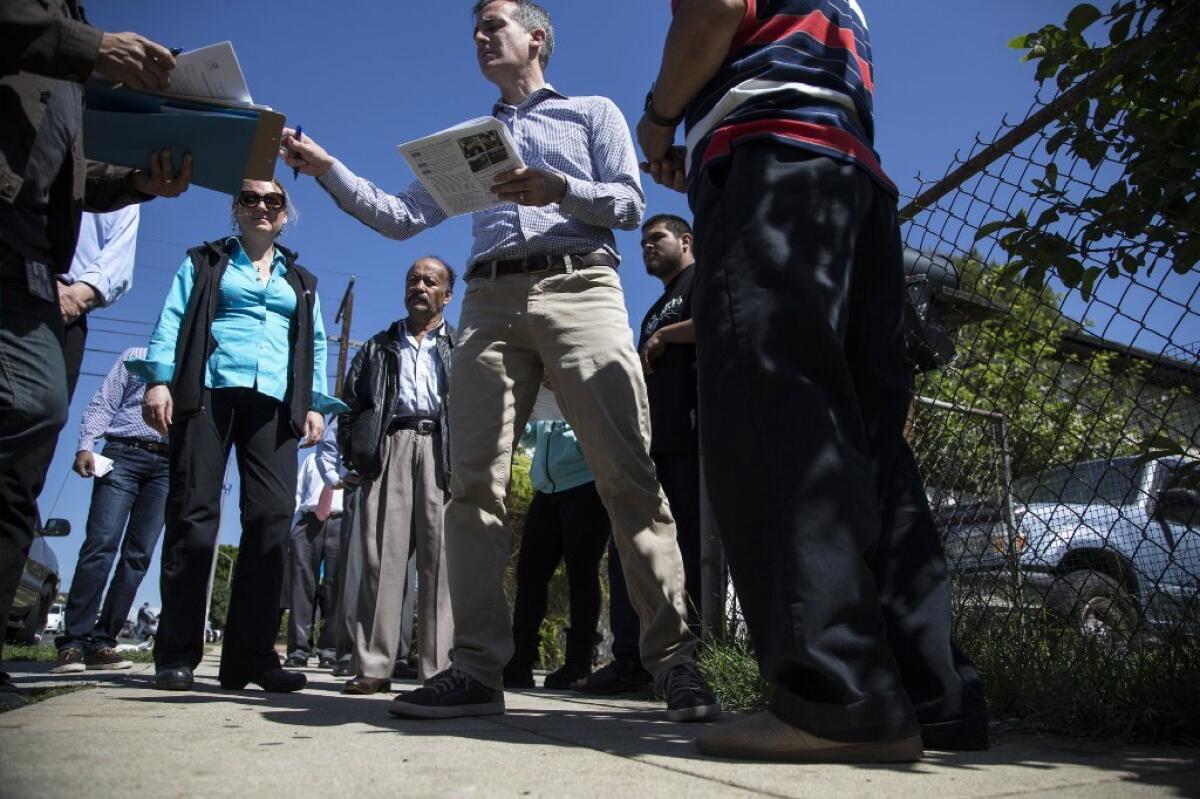Officials reach out to neighbors of shuttered battery recycling plant concerned about lead contamination

Mayor Eric Garcetti chats with residents in Boyle Heights on Saturday.
- Share via
A small army of volunteers led by Los Angeles Mayor Eric Garcetti went door-to-door Saturday to begin the task of assessing the extent of the lead contamination in thousands of homes, businesses and schools surrounding a shuttered battery-recycling plant east of downtown.
At each stop, residents were urged to sign agreements allowing state regulatory officials formal permission to test their yards and gardens for lead, arsenic and other toxins emitted into the air by the Exide Technologies facility in Vernon. Lead dust, a toxic metal, can cause developmental problems -- even at low levels -- with children and pregnant women at greatest risk.
No one turned down the requests in the affected communities of Boyle Heights, East Los Angeles, Commerce, Bell, Huntington Park and Maywood, which had been pushing regulators for years to deal with pollution from the plant, which was processing 11 million used batteries a year when it closed last March.
NEWSLETTER: Get essential California headlines delivered daily >>
“There is no question that this effort should have happened a long time ago,” Garcetti told a gathering of volunteers at Ramon Garcia Recreational Center in Boyle Heights. “But now it’s here. Today is about saving lives and taking action.
“Exide has taken so much from us,” he said, “and we are going to get it back.”
Last month, Gov. Jerry Brown called on the state to spend $177 million to expedite the testing and cleanup of an estimated 10,000 homes within 1.7 miles of the Exide facility and to remove lead from about 2,500 homes with elevated levels of the potent neurotoxin. It is one of the largest state cleanup efforts ever undertaken.
Brown’s proposal was belated but welcomed in working-class Latino communities surrounding the plant, which had come to believe that state regulators had responded more aggressively to address the health affects of the natural gas leak near the wealthy northern San Fernando Valley foothill community of Porter Ranch.
Msgr. John Moretta of Resurrection Catholic Church was only half-kidding Saturday when he told a crowd of supporters at the recreational center, “We were going to petition the city to change the name of this community to Boyle Heights Ranch. But that won’t be necessary anymore.”
A few yards away, residents were lining up to have their blood tested for lead poisoning by Los Angeles County Department of Public Health officials.
There is no safe level of exposure to lead, and children can suffer learning disabilities even with limited exposure. Arsenic, a carcinogen, can cause nausea, decreased blood-cell production and abnormal heart rhythm.
The Legislature this year is expected to approve the $176 million requested by Brown, which would be a supplement to this year’s budget and lent to the California Department of Toxic Substances Control from the state’s general fund. Initial cleanup costs incurred by the state would be recovered later from Exide, officials said.
Exide has been the focus of intense scrutiny since 2013 when a health risk assessment by the South Coast Air Quality Management District found that the plant was posing an elevated cancer risk to more than 100,000 people living in southeast county communities because of arsenic emissions.
The plant, which opened in 1922 and was taken over by Exide in 2000, has been cited several times in recent years, often for exceeding permissible levels of lead.
Exide, which had been operating for decades without a full permit as required by the 1976 federal Resource Conservation and Recovery Act, closed down the plant last year under an agreement with federal prosecutors.
To avoid criminal charges, the company agreed to be responsible for the full cost of cleaning up the lead contamination.
In the meantime, contract testing crews will be taking soil samples in the front and backyards of residents who sign access agreements. If cleanup is needed, contaminated soil will be removed and replaced with clean soil and relandscaped free of charge.
“If you’re interested, we’d love to sign you up,” Garcetti told Alfredo Monreal, 62, one of his first prospective customers during the door-to-door campaign Saturday.
“Just fill out this simple form,” he added, extending a copy of the document and a pen to Monreal.
Later, Monreal mused, “I could use a new lawn. Mine went to weeds after I stopped watering because of the drought.”
Another satisfied customer was Elvira Fernandez, 92, who has lived in the same wood-frame and stucco house for 50 years.
After Fernandez signed up for the soil tests, Garcetti kissed her on the cheek.
Moments later, Fernandez smiled and said, “My kids are sure going to be surprised to see the mayor kissing me on television!”
ALSO
Multiple sex harassment cases against UC faculty prompt new review process
‘Dog whisperer’ Cesar Millan defends himself amid animal cruelty investigation
Petition calls for arrest of D.A. investigator involved in altercation with defense attorney
More to Read
Sign up for Essential California
The most important California stories and recommendations in your inbox every morning.
You may occasionally receive promotional content from the Los Angeles Times.














